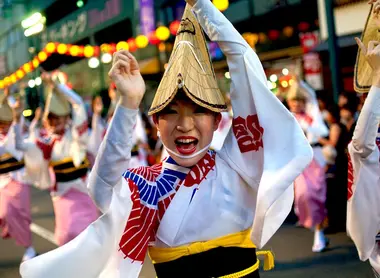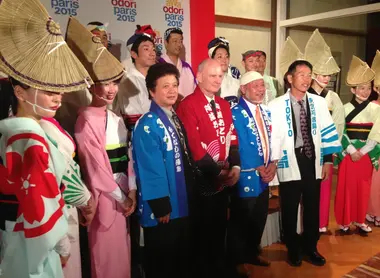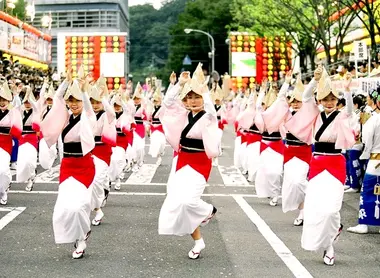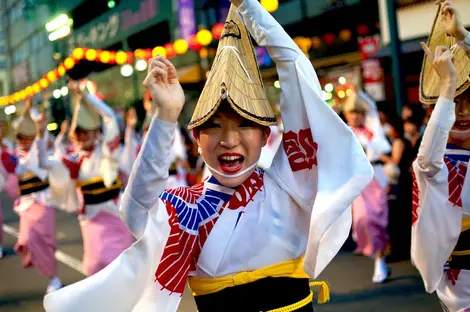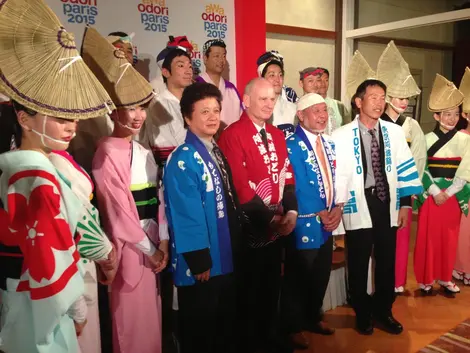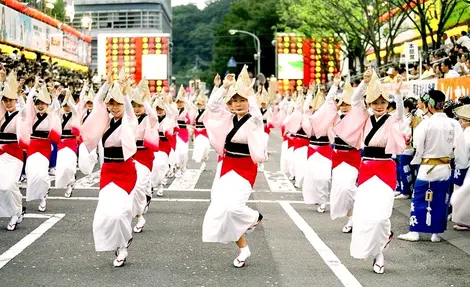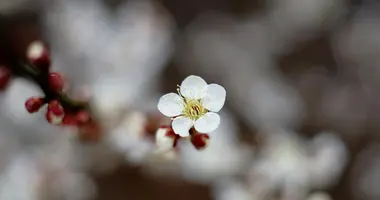Awa Odori Paris - Traditional Japanese dance in France
- Published on : 19/10/2014
- by : La rédaction
- Youtube
Matsuri in the Marais
The Awa Odori, nicknamed "the dance of fools", is one of Japan's most emblematic festivals, and has found a home in the heart of Paris. Originating in Tokushima on the island of Shikoku, this 400-year-old tradition attracts between 1 and 3 million spectators every year in Japan. Over the past few years, this traditional dance has been exported to Paris, allowing the French to discover this vibrant facet of Japanese culture. With its lively rhythms, distinctive movements and festive atmosphere, the Parisian Awa Odori offers an authentic immersion in one of Japan's greatest matsuri. Let's find out how this ancestral practice has found its way to the French capital, and how you can take part.
What is Awa Odori and where does it come from in Japan?
Awa Odori takes its name from the ancient province of Awa, now known as Tokushima Prefecture. This traditional dance originated around 400 years ago, during the Kamakura period, and has its roots in Buddhist prayer dances and kumi-odori, a harvest dance. The festival really took shape in 1586, when the daimyo (local lord) Iemasa Hachisuka organized a grand festival to celebrate the completion of Tokushima Castle. During these festivities, sake was generously distributed to the inhabitants, who, carried away by drunkenness, began to dance in a particular way to the sound of traditional instruments.
Today, the Awa Odori takes place every year from August 12 to 15, during O-bon (the festival of the dead), and transforms Tokushima into a huge dance floor. Groups of dancers, called "Ren", parade through the streets dressed in yukata (summer kimono) or happi (short jacket), with amigasa hats for the women. They dance to the rhythm of traditional instruments such as taiko drums, shinobue flutes and shamisen, chanting "Yattosa! Yattosa!" and "Erai yatcha erai yatcha yoi-yoi-yoi-yoi!".
The distinctive feature of this dance is its specific movements: the women move gracefully, hands raised, palms inwards, while the men adopt a more energetic, dynamic dance style. The festival's famous refrain sums up its spirit: "Crazy people dance, crazy people watch. As long as we're crazy, why not dance?"
Tsunagari Ren: the only Awa Odori band in France
Formed in September 2014 by Ayuko YONEMURA, Tsunagari Ren (literally "the tsunagari troupe", the word tsunagari meaning "link" in Japanese) is to date the only Awa Odori group in France. This unique troupe has already put on numerous shows in France and Japan, and is committed to sharing the dynamics of life and joy characteristic of traditional Japanese festivals.
Tsunagari Ren is a product of the Tsunagari Taiko Center school, which also offers Japanese drumming courses in Paris. The group is made up of both professionals and students eager to spread this tradition in France. What sets the group apart is its approach, which goes beyond mere technique: in addition to choreographic work, members develop a genuine "savoir-être" that enables the group to evolve on a healthy and serene basis, guaranteeing a genuine display of joy during public performances.
For Tsunagari Ren, the practice of Awa Odori is much more than a simple folk dance; it is a vehicle for linking cultures and peoples, and a means of reconnecting with one's body, heart and mind. This philosophy can be felt in every one of their performances, where joy and vitality are palpable.
Tsunagari Ren performance and recognition
Since its creation, Tsunagari Ren has established itself as an ambassador of Awa Odori in France and Europe. In 2015, the group performed at numerous cultural events in France, but also had the honor of participating in the Milan World Expo, bringing Japanese tradition to the international stage.
The quality of their performances also enabled them to take to the streets of Tokyo, where they literally set the Japanese public alight. This recognition in Japan itself testifies to the authenticity and professionalism of the Parisian troupe. The Japanese Awa Odori community praised the quality of their dance, a major accolade for a foreign group.
As a culmination of this recognition, Tsunagari Ren was officially invited to Tokushima, the birthplace of Awa Odori, by the Awa Odori Federation itself. This invitation was intended to create the first cultural bridges between Japan and France around this tradition, confirming the Parisian group's role as cultural ambassadors.
At the same time, the Awa Odori was also presented to the Parisian public at a special event in 2015, supported by the Japanese public authorities and various partners. This "Matsuri dans le Marais" brought together around a hundred dancers and musicians from Tokushima and the Kôenji district (in Shinjuku), transforming the Place des Vosges into an authentic Japanese festival. The success of this event led to the programming of a new edition, reinforcing the cultural links between Paris and Japan.
How to join the group and take part in Awa Odori classes in Paris
If you've fallen in love with this tradition and would like to learn Awa Odori, you can join the group in Paris thanks to the classes offered by the Tsunagari Taiko Center. The school offers weekly Awa Odori classes, accessible to beginners and more experienced dancers alike.
To join the group, the first step is to participate in a trial class. These classes are open to all, with no particular prerequisites: you don't need to have a sense of rhythm or be particularly flexible. Tsunagari's pedagogical approach allows everyone to discover this dance at their own pace and gradually connect to the energy and spirit of Awa Odori.
If this initial experience convinces you, you can then sign up for a trimester, after validation with the teacher. The commitment is made over a period of three months (September-December, January-March or April-June), enabling coherent progression. Classes are held on Saturdays from 3pm to 5pm, at 12 bis rue Froment, in the 11th arrondissement of Paris, easily accessible by the Breguet-Sabin, Chemin-Vert, Voltaire or Bastille metros.
Classes and prices
Tsunagari Taiko Center's Awa Odori classes are organized on a quarterly basis, enabling participants to commit to a set period and make steady progress. Each session lasts 2 hours and costs €42, a price that reflects the quality of the teaching and the expertise of the instructors.
When you sign up, you start with a first class. If you're happy with what you're doing, you can then sign up for a whole trimester, after checking with the instructor. Payment for the term is made on a monthly basis, making it easier to manage your budget.
Classes follow a progressive pedagogy that combines :
- Learning the fundamental steps and movements characteristic of Awa Odori
- Connecting with your body's sensations, essential for moving towards greater ease in dance
- Development of pleasurable sensations that enable natural expression of the joy inherent in this "dance of fools"
- Understanding the rhythm and musicality specific to Awa Odori
This comprehensive approach enables participants to gradually acquire not only the technique, but also the spirit of this traditional Japanese dance.
Practice objectives and associated events
The practice of Awa Odori at the Tsunagari Taiko Center pursues several objectives that go far beyond the simple technical mastery of a folk dance. The primary aim of these courses is to learn the dance so as to be able to take part in parades at cultural events organized by the center or proposed by external partners.
Students wishing to develop their skills further can alsojoin the Tsunagari Ren stage group, which performs in concert several times a year. This perspective offers additional motivation and enables students to fully experience the performative and collective dimension of Awa Odori.
Beyond these technical and performative aspects, the practice of Awa Odori in Paris also aims to :
- Promote reconnection with body, heart and mind
- Develop a source of joy and vitality that can be applied to everyday life
- Create bonds between participants and cultivate a group spirit
- Share and promote Japanese culture in France
- Contribute to intercultural dialogue between France and Japan
Students regularly take part in various Japanese cultural events in Paris, such as demonstrations at festivals and events related to Japanese culture, reinforcing their role as cultural ambassadors.
Tsunagari Ren's unique approach: technique, choreography and interpersonal skills
What really sets Tsunagari Ren apart from other traditional dance groups is its holistic approach, which integrates three fundamental dimensions: technique, choreography and interpersonal skills. This philosophy, developed by Ayuko YONEMURA, the group's founder, enables Awa Odori to be understood as an art of living rather than a mere artistic performance.
On a technical level, classes enable students to acquire the fundamental steps and movements of Awa Odori with precision. Students learn how to bend their legs and lift their arms, with characteristic movements that differ for men and women. This solid technical foundation is essential if the spirit of the dance is to be fully expressed.
The choreographic aspect helps them understand the spatial organization of parades and the coordination between dancers. Students learn to move as a group, maintain formation and interact with the musicians who traditionally accompany Awa Odori dancers. This collective work develops listening skills and strengthens group cohesion.
But what really sets Tsunagari Ren apart is its in-depth focus on interpersonal skills. Beyond technique, participants are invited to explore their bodily feelings, connect with their inner energy and develop an authentic presence. This dimension enables the group to evolve together, on a healthy and serene basis, guaranteeing a genuine display of joy during public performances.
This unique approach makes practicing Awa Odori with Tsunagari Ren a transformative experience that goes far beyond learning a folk dance. It offers participants an opportunity for personal development, while contributing to the transmission of an age-old cultural tradition between Japan and France.
